search
date/time
 | Yorkshire Times A Voice of the Free Press |

Andrew Liddle
Guest Writer
12:00 AM 10th July 2025
arts
A Pride and Prejudice For The Age In Scarborough
Andrew Liddle was at the first night of new production, at the SJT
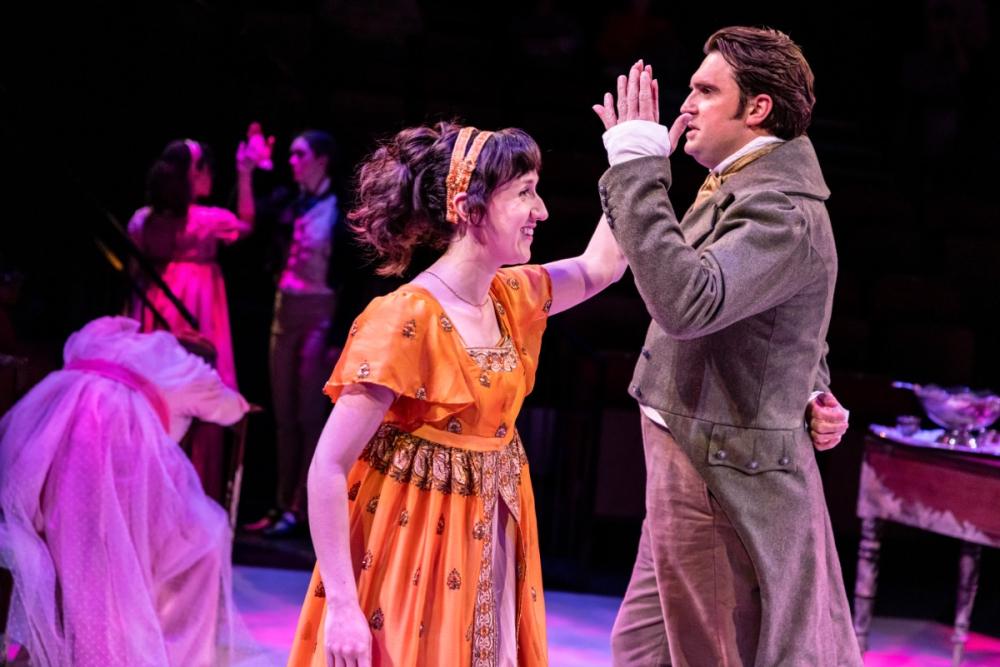
(L-R)Rosa Hesmondhalgh, James Sheldon
Photo: © Pamela Raith Photography
Last year Miss Hamill was America’s ‘most produced playwright’, having first come to prominence in 2017 for her adaptation of Austen’s Sense and Sensibility, which won her the honour of being the Wall Street Journal’s Playwright of the Year. The American off-Broadway audiences clearly love her zesty adaptations of a whole range of female-centred classics but how would she go down in this country, where surprisingly she remains little known. Scarborough’s answer came in the resounding cheers at the end as the members of the audience, old and young, took to their feet to applaud, long and loud.
Mind you this version might have been written for the joyous intimacies of this theatre’s round - and must have been a joy to direct for Lotte Wakeham, working her magic on its UK premiere production at the Bolton Octagon last month - which received rave reviews, incidentally. Her programme notes speak of the ‘huge fun’ in rehearsals, ‘irreverence’ and inspiration being taken from ‘romcoms and other adaptations’.
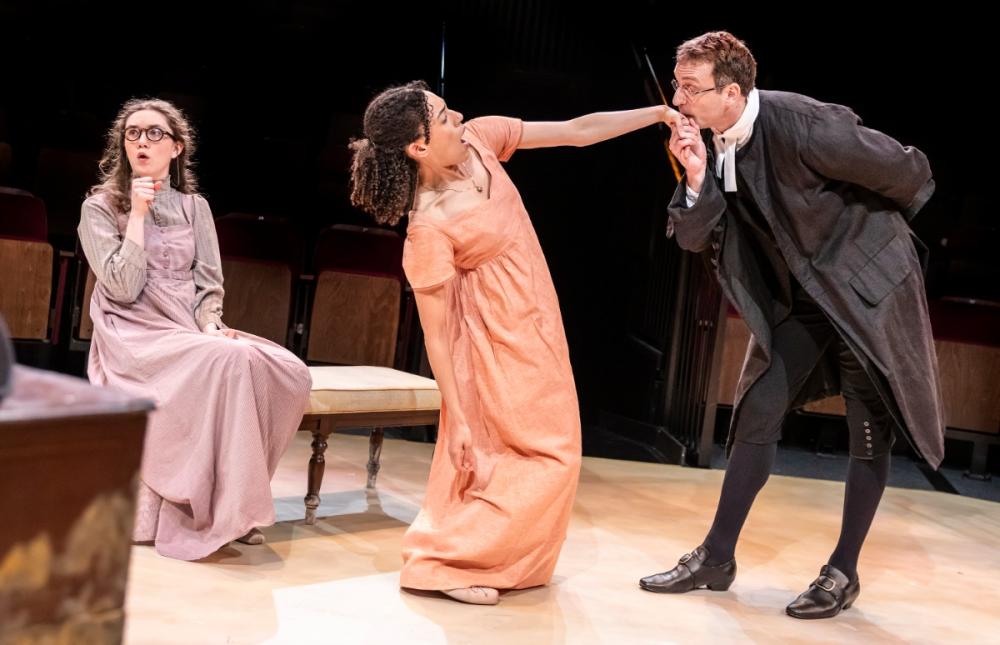
(L-R)Eve Pereira, Aamira Challenger, Ben Fensome
Photo: © Pamela Raith Photography
Rosa Hesmondhalgh is note-perfect as Lizzie, the eldest, wittiest and most perceptive of the four Bennet sisters (a fifth has been dispensed with in this adaptation), who vows not to marry, or at least not simply for financial security. She flatly refuses the proposal of her cousin, the odious Reverend Collins, even though such a match would allow the family to keep their estate.
That her mother should think the rejection of such a man - whose cringeworthy toadying, off the Richter magnitude scale in self-abasing pomposity, inspires the mother of all comic turns from Ben Fensome - is a tragedy of epic proportions tells us everything about society of the time.
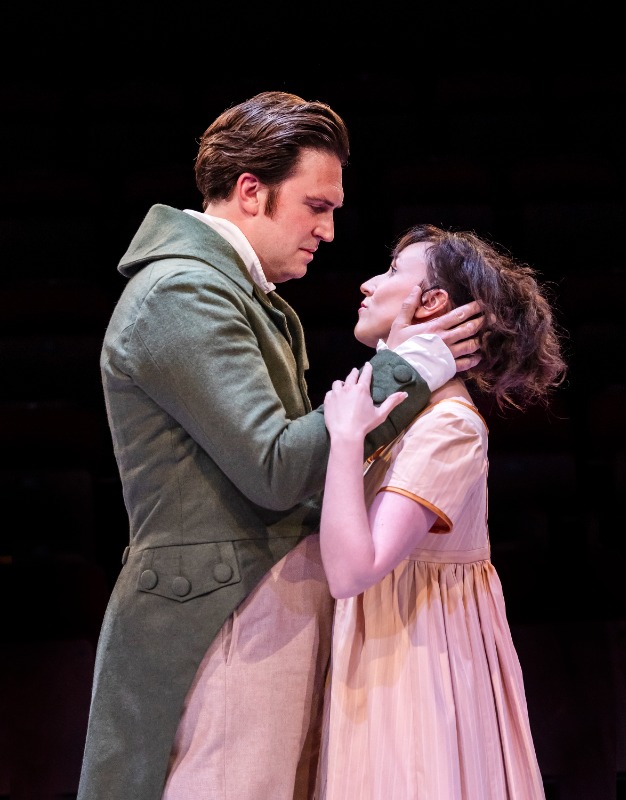
(L-R) James Sheldon, Rosa Hesmondhalgh
Photo: © Pamela Raith Photography
Fortunately, Lizzie inherits more of her father’s detachment than her mother’s derangement. Dyfrig Morris is the long-suffering Mr. Bennet, better described as patience behind a newspaper than on a monument, a silent and stoic sufferer in a house where marital intrigue is the only important topic of conversation.
Less obviously right is Lizzie’s summary rejection of one of the most eligible men in England. We might see what she cannot, that Mr. Darcy is rather more gauche, restrained and self-possessed than offensively superior - and may be as much a victim as a product of his aristocratic upbringing. We get an unsavoury reek of his background in the form of Lady Catherine De Bourgh (Jessica Ellis), the dominating dowager who seeks to control her nephew’s impulses and marry him to her own daughter. Wilde’s Lady Bracknell is living proof of the indomitable presence of such types.
Darcy’s unexpected proposal to Lizzie, seemingly blurted out against his better judgement, is a case study in what not to say in asking for a lady’s hand - but in his favour it reveals a man battling to free his heart from the constraints and prejudices he’s been raised to accept.
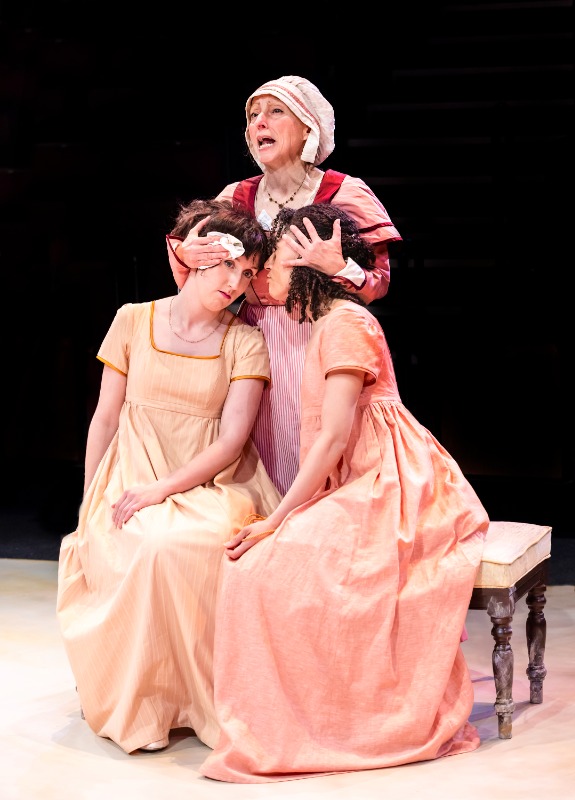
(L-R) Rosa Hesmondhalgh, Joanna Holden, Aamira Challenger
Photo: © Pamela Raith Photography
Lizzie’s younger and prettier sister, as Austen is always at pains to tell us, is Jane. Aamira Challenger has everything it takes to play the English rose, the fragrant variety without thorns, ripe for plucking. It appears to be love at first sight when she and the amiable Mr. Bingley (Eve Pereira) find themselves in close proximity. If it seems too good to be true, so it is. Again the impediment is to be found embedded in upper class reluctance to admit a commoner thread to its social fabric .
Speaking of threads, it seems a decent bet that Mary, bookish, moralistic and heavy handed on the spinet, is most likely to remain a spinster, whilst no one would put money on the flighty 14-year old (Jessica Ellis ) being the first sister to marry. But she might not see it that way when the soldiers are in town and one handsome lieutenant, Mr. Wickham (Ben Fensome), is a frequent visitor while the punch is flowing freely.
The storylines, including Wickham’s scandalous triflings and unspeakable lack of honour, are probably well known to readers, anyway, so suffice it to say, there are many twists and turns, rather more of the comic kind than the genuinely suspenseful, on the way. It’s not so much the narrative arc that takes our fancy as the incidentals encountered on the way, the protocols to be overcome, the accommodations made, the pridefulness put in its place in order that love can find its way and triumph over those unfortunate materialities that so often in the real world stand in the way.
The nine-strong ensemble, directed with real pace and brio, by Wakeham, delight to showcase their flair and timing in a play that contains so much richly comic material, with elements of farce, spoof, parody, slapstick, lampoon, farce … you name it! And yet … and yet … we had a very moist ending. Not a few tears might have been shed when the most powerful and enduring theme in romantic fiction resolved itself to our satisfaction.
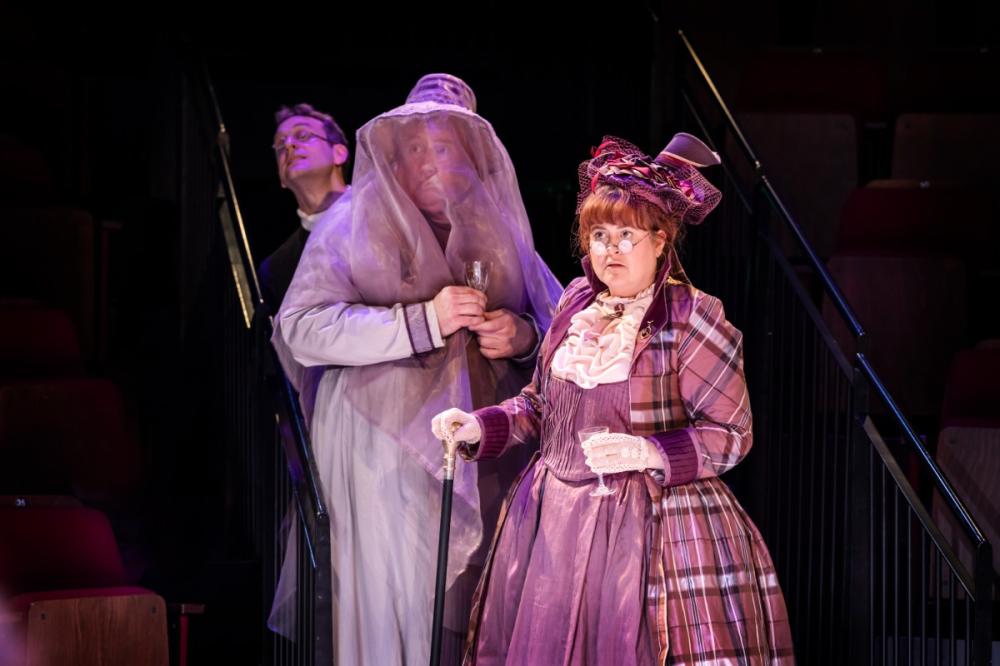
Ben Fensome, Dyfrig Morris, Jessica Ellis
Photo: © Pamela Raith Photography
I’m not exactly sure that many of the younger members of the audience were even aware of one nicely contrived anachronism - the music - so deeply embedded in the soundtrack of their age are they. What a touch of genius, presumably from Sonum Batra, composer and musical director, to sonorously insinuate elegant string quartet snatches of such as Don’t You Want Me Baby, There She Goes and Why Does it Always Rain on Me?, at appropriate moments.
By the time the romantic ending was culminating in a kiss, Lizzie aloft in Darcy’s strong arms, to the accompaniment of Elton John’s Your Song, the two were making it their song and sending the audience into an ecstasy of applause. You would have had to have a heart of stone not to get caught up in the emotion.
Don’t miss this under any circumstances. I think this critic might want to see it again before the month is out.